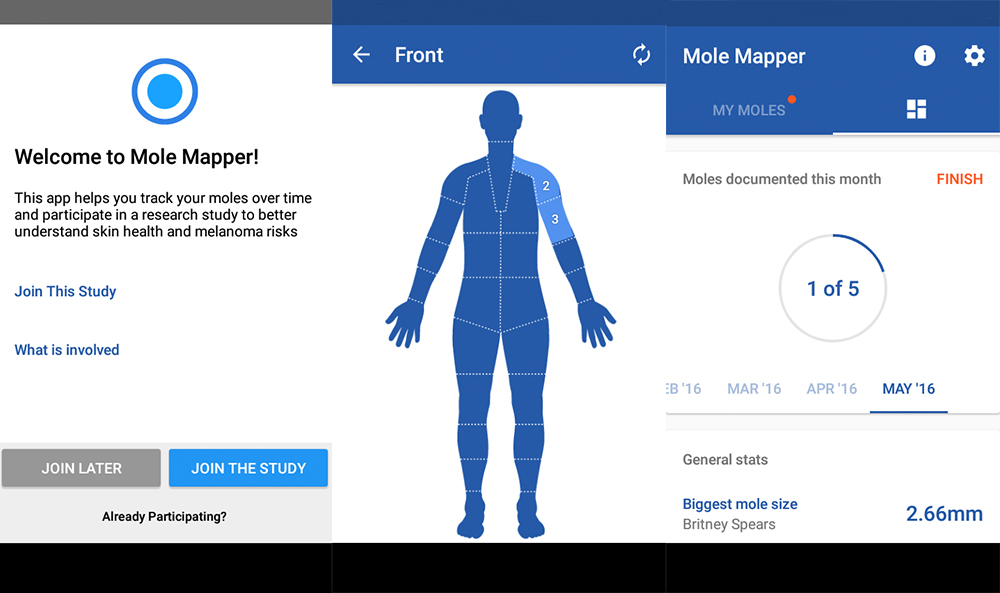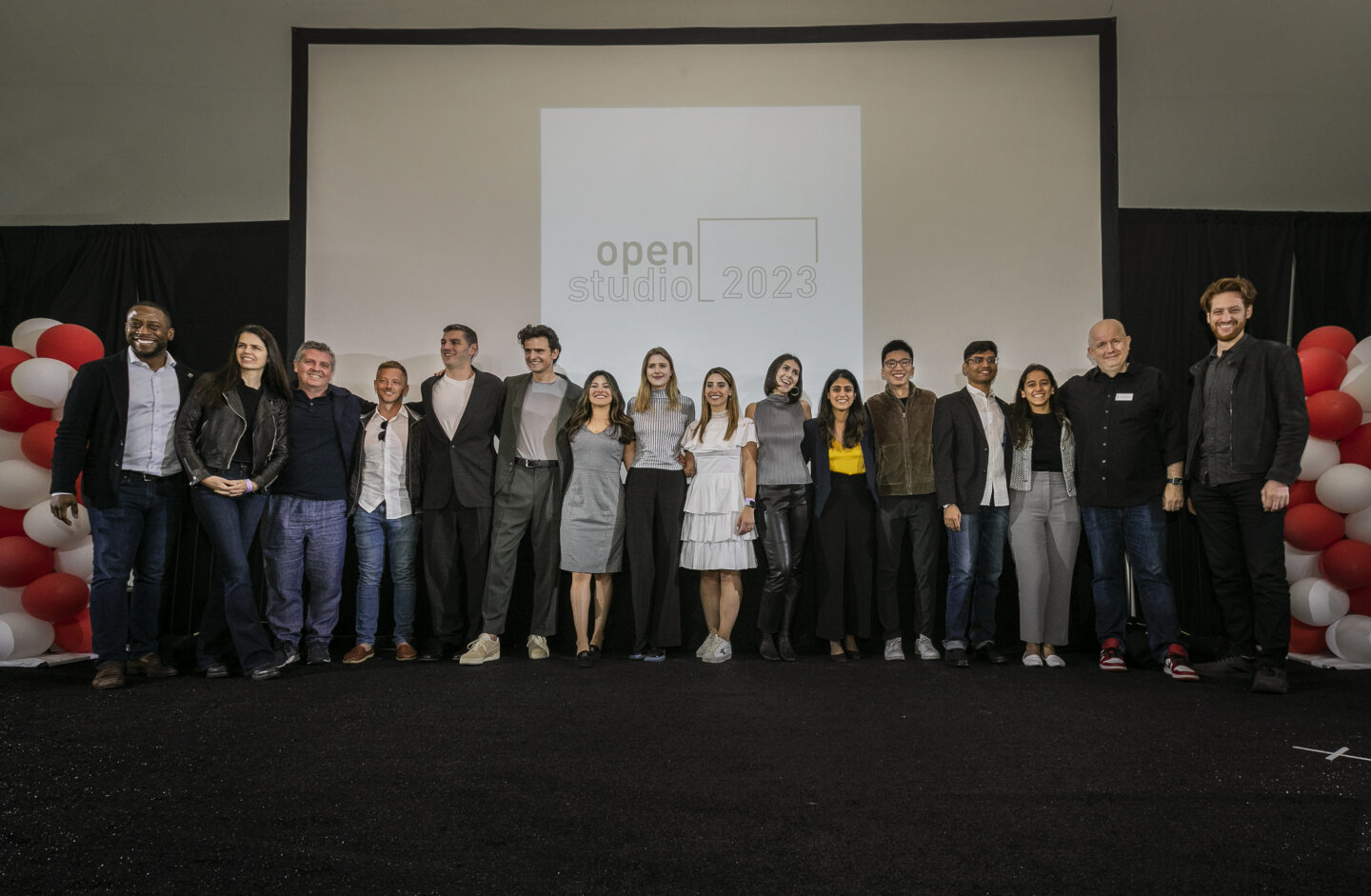
Open source framework announces Android app for tracking moles and melanoma, allowing majority of smartphone users to participate in health and medical studies
NEW YORK — Cornell Tech, Open mHealth, and Oregon Health & Science University (OHSU) today announced the launch of MoleMapper on the Google Play store, bringing the popular mole tracking and melanoma research app to the Android platform. The launch coincides with the release of ResearchStack, a project enabled by seed funding from the Robert Wood Johnson Foundation to extend research functionalities currently found in Apple’s ResearchKit(™) to Android with the aim of significantly expanding and diversifying the number of people who can participate in medical research studies.
“We are thrilled to launch ResearchStack, which will more than double the size of the population that can use medical research apps,” said Deborah Estrin, professor of Computer Science at Cornell Tech and co-founder of Open mHealth. “ResearchKit(™) was revolutionary in making it easy to build modular research applications for mobile phones, and now medical researchers can reach even more people. I look forward to tremendous growth in these mobile research ‘Evidence Engines’ as health researchers, patient communities, and mobile developers create new research apps.”
MoleMapper Android, the first app to be released using the framework, is fully-featured Android version of the popular MoleMapper ResearchKit(™) app on iOS. The ResearchStack team collaborated closely with the teams at OHSU and Sage Bionetworks to develop both the ResearchStack framework and MoleMapper. The team’s objective was to allow Android users to participate in MoleMapper’s mole tracking and melanoma research goals, in addition to providing a testbed for vetting the framework against the needs of an advanced mobile research study, including data validation and Institutional Review Board approval. Data from the Mole Mapper study will be hosted and distributed to the research community on Synapse, Sage Bionetwork’s platform for collaborative data science.
“As a physician, it’s been incredible to see people mapping their moles with MoleMapper and becoming more proactive about their skin health,” said Sancy Leachman, M.D., Ph.D. and director of the OHSU Knight Cancer Institute’s melanoma research program. “Bringing this app to even more users on Android gives us an opportunity to bring that opportunity to an even bigger audience. And, it gives us the means to bring in more data to fuel melanoma research.”
“What was most exciting about bringing a research study app like MoleMapper to Android was seeing how it leverages feedback loops,” said Michael Carroll, VP of Engineering at RubiconMD and a former Technologist-in-Residence at Cornell Tech that leads the ResearchStack project. “Users want to securely and easily track their moles, researchers want to more data about mole growth — taken together these two needs create a virtuous circle that everybody benefits from.”
In addition to the involvement from Cornell Tech, OHSU and Sage Bionetworks, two development shops, Exygy and touchlab, contributed to the design and implementation of portions of the ResearchStack framework and the MoleMapper app. Open mHealth, a nonprofit that provided an open standard for mobile health data, advised on clinically-valid data formatting on ResearchStack.
“It is very exciting to see the first app for ResearchStack launch, increasing the opportunities for both the research and patient communities to participate in smartphone studies,” said Paul Tarini, senior program officer at the Robert Wood Johnson Foundation. “In order to build a Culture of Health, we must continue to advance efforts that ensure the broadest inclusion, and this is a huge step forward.”
For more information, visit http://researchstack.org.
ABOUT CORNELL TECH
Cornell Tech develops pioneering leaders and technologies for the digital age. Cornell Tech brings together faculty, business leaders, tech entrepreneurs, and students in a catalytic environment to produce visionary results grounded in significant needs that will reinvent the way we live in the digital age. Cornell Tech’s temporary campus has been up and running at Google’s Chelsea building since 2012, with a growing world-class faculty, and about 150 master’s and Ph.D. students who collaborate extensively with tech-oriented companies and organizations and pursue their own start-ups. Construction is underway on Cornell Tech’s campus on Roosevelt Island, with a first phase due to open in 2017. When fully completed, the campus will include 2 million square feet of state-of-the-art buildings, over 2 acres of open space, and will be home to more than 2,000 graduate students and hundreds of faculty and staff.
ABOUT OPEN mHEALTH
Open mHealth is breaking down the barriers to integration and making mobile health data clinically useful. With a community of developers and clinical experts, it builds tools which make it easier to use mobile health data all on top of an open standard. Open mHealth is a nonprofit started in 2011 with a team from all around the world. Learn more at openmhealth.org.
ABOUT SAGE BIONETWORKS
Sage Bionetworks is a nonprofit biomedical research organization, founded in 2009, with a vision to promote innovations in personalized medicine by enabling a community-based approach to scientific inquiries and discoveries. Sage Bionetworks strives to activate patients and to incentivize scientists, funders and researchers to work in fundamentally new ways in order to shape research, accelerate access to knowledge and transform human health. It is located on the campus of the Fred Hutchinson Cancer Research Center in Seattle, Washington and is supported through a portfolio of philanthropic donations, competitive research grants, and commercial partnerships. More information is available at http://www.sagebase.org. Sage Bionetworks is the developer of Bridge Server, a system for securely acquiring data from mobile health applications, and Synapse, a system supporting collaborative data-driven research in biomedicine.
ABOUT THE OHSU KNIGHT CANCER INSTITUTE
The Knight Cancer Institute at Oregon Health & Science University is a pioneer in the field of precision cancer medicine. The institute’s director, Brian Druker, M.D., helped prove it was possible to shut down just the cells that enable cancer to grow. This breakthrough has made once-fatal forms of the disease manageable and transformed how cancer is treated. The OHSU Knight Cancer Institute is the only National Cancer Institute-designated Cancer Center between Sacramento and Seattle – an honor earned only by the nation’s top cancer centers. It is headquarters for one of the National Cancer Institute’s largest research collaboratives, SWOG, in addition to offering the latest treatments and technologies as well as hundreds of research studies and clinical trials. For additional information on the OHSU Knight Cancer Institute visit www.ohsu.edu/xd/health/services/cancer or follow us on Facebook and Twitter.
ABOUT TOUCHLAB
Touchlab is America’s Android-first Development and Design Shop. Founded in 2011, we keep deep ties to the development and design community by running the NY Android Developer meetup and Droidcon NYC. In 2016 Google recognized touchlab as one of the first ever Google Certified Agencies. We’re fortunate to be the team that brands like NBC Universal and the Jane Goodall Institute turn to build exceptional Android experiences. Learn more at touchlab.co or follow us on Twitter at twitter.com/touchlabNY.
ABOUT EXYGY
Exygy (http://exygy.com/) is a strategy, design, and engineering firm. Exygy focuses on the for-purpose sector which means work with nonprofits, foundations, HealthTech, CivicTech, EdTech, CleanTech, and more – anywhere we can use our skills to design and build great products in a way that moves the needle to create progressive social change.
Media Highlights
Tech Policy Press
Content Moderation, Encryption, and the LawRELATED STORIES




